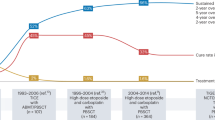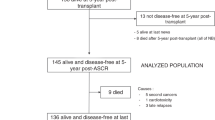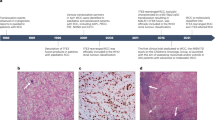Abstract
Children with Wilms tumor who have a particular risk of failure at relapse or at primary diagnosis were treated with high-dose chemotherapy (HDC) and autologous peripheral blood stem cell rescue in order to improve their probability of survival. From April 1992 to December 1998, 23 evaluable patients received HDC within the German Cooperative Wilms Tumor Studies. Nineteen were given melphalan, etoposide and carboplatin (MEC); the others received different regimens. The dose of carboplatin was adjusted according to renal function. Indications for HDC were high-risk relapse in 20 patients, bone metastases in two patients and no response in one patient. Fourteen of 23 patients are alive after a median observation time of 41 months, 11 of 14 in continuous complete remission, three in CR after relapse post HDC. The estimated survival and event-free survival for these patients are 60.9% and 48.2%. Twelve children relapsed after HDC; nine of them died within 12 months and three are surviving from 20 to 33 months after relapse. The main toxicities were hematologic, mucositis and renal (tubular dysfunction; intermittent hemodialysis in one patient). There were no toxic deaths. About half of the children suffering from Wilms tumor with very unfavorable prognostic factors survive disease-free after HDC for over 3 years. Besides hematological toxicity, mucositis and infections, renal function is at risk during HDC. With dose adjustment on glomerular filtration rate, however, no permanent renal failure was observed.
This is a preview of subscription content, access via your institution
Access options
Subscribe to this journal
Receive 12 print issues and online access
$259.00 per year
only $21.58 per issue
Buy this article
- Purchase on SpringerLink
- Instant access to full article PDF
Prices may be subject to local taxes which are calculated during checkout

Similar content being viewed by others
References
D'Angio GJ, Breslow NE, Beckwith JB et al. Treatment of Wilms’ tumor: results of the Third National Wilms’ Tumor Study Cancer 1989 64: 349 360
Green DM, Breslow NE, Evans I et al. Treatment of children with stage IV favorable histology Wilms tumor: a report from the National Wilms Tumor Study Group Med Pediatr Oncol 1996 26: 147 152
Green DM, Breslow NE, Beckwith JB et al. Treatment with nephrectomy only for small, stage I/favorable histology Wilms’ tumor: a report from the National Wilms'Tumor Study Group J Clin Oncol 2001 19: 3719 3724
Pritchard J, Imeson J, Barnes J et al. Results of the United Kingdom Children's Cancer Study Group first Wilms’ tumor study J Clin Oncol 1995 13: 124 133
Mitchell C, Morris Jones P, Kelsey A et al. The treatment of Wilms tumour: results of the UKCCSG second Wilms tumor study Br J Cancer 2000 83: 602 608
Lemerle J, Voute PA, Tournade MF et al. Effectiveness of preoperative chemotherapy in Wilms’ tumor: results of an International Society of Paediatric Oncology (SIOP) clinical trial J Clin Oncol 1983 10: 604 609
Tournade MF, Com-Nougaé C, Voute PA et al. Results of the Sixth International Society of Pediatric Oncology Wilms’ tumor trial and study: a risk-adapted therapeutic approach in Wilms’ tumor J Clin Oncol 1993 11: 1014 1023
Graf N, Tournade MF, de Kraker J . The role of preoperative chemotherapy in the management of Wilms’ tumor. The SIOP studies (International Society of Pediatric Oncology) Urol Clin North Am 2000 27: 443 450
Tournade MF, Com-Nouge C, de Kraker J et al. Optimal duration of preoperative therapy in unilateral and nonmetastatic Wilms tumor in children older than 6 months: results of the ninth International Society of Pediatric Oncology Wilms’ Tumor trial and study J Clin Oncol 2001 19: 488 500
Grundy P, Breslow N, Green DM et al. Prognostic factors for children with recurrent Wilms’ tumor: results from the second and third National Wilms’ Tumor Study J Clin Oncol 1989 7: 638 667
Pein F, Pinkerton R, Tournade MF et al. Etoposide in relapsed Wilms’ tumor: a phase II study by the French Society of Pediatric Oncology and the United Kingdom Children‘s Cancer Study Group J Clin Oncol 1993 11: 1478 1481
Faith H, Kung MD, Pratt CB et al. Ifosfamide/etoposide combination in the treatment of recurrent malignant solid tumors of childhood Cancer 1993 71: 1898 1903
Miser J, Krailo M, Hammond DG et al. The combination of ifosfamide (IFOS), etoposide (VP-16) and MESNA (M): a very active regimen in the treatment of recurrent Wilms-tumor (WT) Proc Am Soc Clin Oncol 1993 12: 417 (Abstr.)
Pein F, Tournade MF, Zucker JM et al. Etoposide and carboplatin: a highly effective combination in relapsed or refractory Wilms’ tumor – a phase II study by the French Society of Pediatric Oncology J Clin Oncol 1994 12: 931 936
Warkentin PI, Brochstein JA, Stranjord SE et al. High dose therapy followed by autologous stem cell rescue for recurrent Wilms tumor (WT) Proc Am Soc Clin Oncol 1993 12: 414 (Abstr.)
Garaventa A, Hartmann O, Bernard JL et al. Autologous bone marrow transplantation for pediatric Wilms tumor: the experience of the European Bone Marrow Transplantation Solid Tumor Registry Med Pediatr Oncol 1994 22: 11 14
Calvert AH, Newell DR, Gumbrell LA et al. Carboplatin dosage: prospective evaluation of a simple formula based on renal function J Clin Oncol 1989 7: 1748 1756
Pein F, Michon J, Volteau-Couanet D et al. High-dose melphalan, etoposide and carpoblatin followed by autologous stem-cell rescue in pediatric high risk recurrent Wilms’ tumor: a French Society of Pediatric Oncology Study J Clin Oncol 1998 16: 3295 3301
Hempel L, Kremens B, Weirich A et al. High dose consolidation with autologous stem cell rescue (ASCR) for nephroblastoma initially treated according to the SIOP 9/GPOH trial and study Klin Pädiatr 1996 208: 186 189
Pinkerton GR, Groot-Loonen JJ, Morris-Jones PH et al. Response rates in relapsed Wilms’ tumor. A need for new effective agents Cancer 1991 67: 567 571
Tournade MF, Lemerle J, Brunat-Mentigny M et al. Ifosfamide is an active drug in Wilms'tumor: a phase II study conducted by the French Society of Pediatric Oncology J Clin Oncol 1988 6: 793 796
Miser JS, Tournade MF . The management of relapsed Wilms'tumor Hematol Oncol Clin North Am 1995 9: 1287 1302
Hempel L, Patzer L, Misselwitz J et al. Complete recovery of renal function in a Wilms’ tumor patient after acute renal failure caused by autologous bone marrow transplantation (ABMT) Pediat Hematol Oncol 1998 15: 255 260
Green DM, Yevgeny A, Nan B et al. Congestive heart failure after treatment for Wilms’ tumor: a report from the National Wilms’ Tumor Study Group J Clin Oncol 2001 19: 1926 1934
Villablanca J . Personal communication
Grundy PE, Telzerow PE, Breslow N et al. Loss of heterozygosity for chromosomes 16q and 1 p in Wilms tumors predicts an adverse outcome Cancer Res 1994 54: 2331 2335
Eggert A, Grotzer MA, Thao H et al. Expression of the neurotrophin-receptor TrkB predicts outcome in nephroblastomas: results of a pilot-study Klin Pädiatr 2001 213: 191 196
Author information
Authors and Affiliations
Rights and permissions
About this article
Cite this article
Kremens, B., Gruhn, B., Klingebiel, T. et al. High-dose chemotherapy with autologous stem cell rescue in children with nephroblastoma. Bone Marrow Transplant 30, 893–898 (2002). https://doi.org/10.1038/sj.bmt.1703771
Received:
Accepted:
Published:
Issue date:
DOI: https://doi.org/10.1038/sj.bmt.1703771
Keywords
This article is cited by
-
High dose chemotherapy and autologous hematopoietic cell transplantation for Wilms tumor: a study of the European Society for Blood and Marrow Transplantation
Bone Marrow Transplantation (2020)
-
Outcomes following autologous hematopoietic stem cell transplant for patients with relapsed Wilms’ tumor: a CIBMTR retrospective analysis
Bone Marrow Transplantation (2017)
-
Rationale for the treatment of Wilms tumour in the UMBRELLA SIOP–RTSG 2016 protocol
Nature Reviews Urology (2017)
-
SCT for Wilms’ tumour
Bone Marrow Transplantation (2008)
-
Management of Wilms tumor: current standard of care
Nature Clinical Practice Urology (2008)



